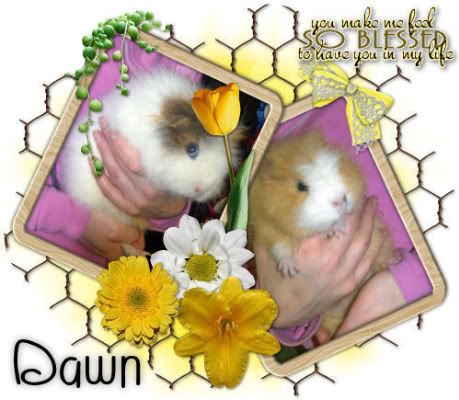Post by Dawn - Admin on Oct 22, 2006 20:04:57 GMT
Being Observant
...can save your piggy's life. How often do you just stand and watch what your guineas are doing? Knowing your guineas well can sometimes mean the difference between life and death for them. Guineas are very good at hiding pain and illness. In the wild, they live in groups, and if there are any signs of weakness or sickness, guineas get chased out of the group. As with most animals in the wild, only the fittest survive. When guineas get sick, they often go downhill very quickly, so you only have a very small window of opportunity to get them to the vet for treatment.
Daily observation is particularly important where there are larger groups of guineas living together. If you have 6 guineas together (for example), would you know which one was passing blood or not eating?
Regular handling and weighing also helps you to get to know your guinea. Here are some of the things to look for:
- are there any lumps or bumps that shouldn't be there?
- is their hair and skin clean, or is it looking greasy / scurfy, or falling out in clumps?
- are they scratching a lot and causing sores?
- are their eyes and nose clean and clear with no discharge / crustiness / cloudiness?
- do they move normally without any signs of pain / limping / head tilt?
- is their breathing normal / wheezy / laboured?
- are they bright, inquisitive and eager for food?
- are their feet and nails in good condition (no scabs or swelling)?
- is there any sign of blood in the cage?
- are their poops normal (size and quantity)?
- are they hunched up, hair puffed up, sitting in the corner looking miserable, or feeling cold?
- is their chin wet, or does their mouth have sores around it?
- are they eating and drinking well?
- are they gaining / loosing weight? Guineas can loose weight incredibly quickly, but with daily handling and regular weighing, this should soon be spotted before it becomes a major problem.
Spending time watching your guineas each day and getting to know what is "normal" for each one can help you to spot when they are showing even minor signs of being ill.
© Gorgeous Guineas 2006
...can save your piggy's life. How often do you just stand and watch what your guineas are doing? Knowing your guineas well can sometimes mean the difference between life and death for them. Guineas are very good at hiding pain and illness. In the wild, they live in groups, and if there are any signs of weakness or sickness, guineas get chased out of the group. As with most animals in the wild, only the fittest survive. When guineas get sick, they often go downhill very quickly, so you only have a very small window of opportunity to get them to the vet for treatment.
Daily observation is particularly important where there are larger groups of guineas living together. If you have 6 guineas together (for example), would you know which one was passing blood or not eating?
Regular handling and weighing also helps you to get to know your guinea. Here are some of the things to look for:
- are there any lumps or bumps that shouldn't be there?
- is their hair and skin clean, or is it looking greasy / scurfy, or falling out in clumps?
- are they scratching a lot and causing sores?
- are their eyes and nose clean and clear with no discharge / crustiness / cloudiness?
- do they move normally without any signs of pain / limping / head tilt?
- is their breathing normal / wheezy / laboured?
- are they bright, inquisitive and eager for food?
- are their feet and nails in good condition (no scabs or swelling)?
- is there any sign of blood in the cage?
- are their poops normal (size and quantity)?
- are they hunched up, hair puffed up, sitting in the corner looking miserable, or feeling cold?
- is their chin wet, or does their mouth have sores around it?
- are they eating and drinking well?
- are they gaining / loosing weight? Guineas can loose weight incredibly quickly, but with daily handling and regular weighing, this should soon be spotted before it becomes a major problem.
Spending time watching your guineas each day and getting to know what is "normal" for each one can help you to spot when they are showing even minor signs of being ill.
© Gorgeous Guineas 2006





